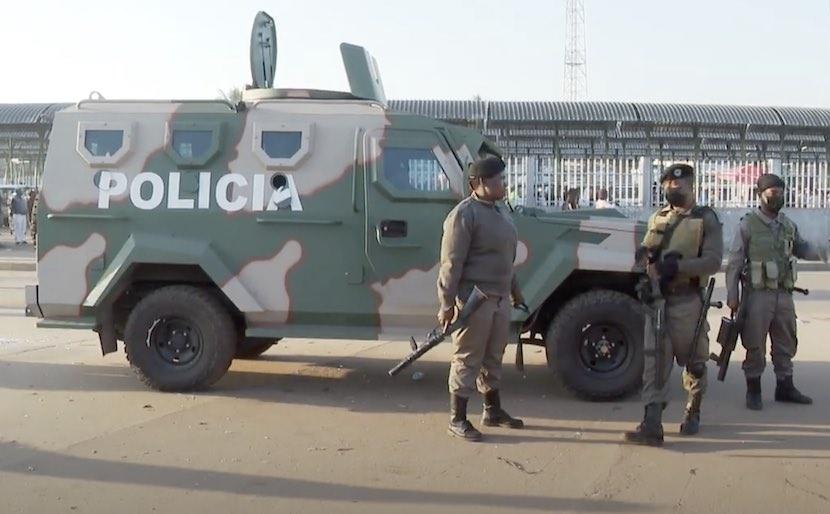Africa-Press – Mozambique. Even after the government and operators of the minibuses, commonly known as “Chapas”, which provide much of the passenger transport in Mozambican cities, claimed they had reached an agreement, the transport crisis has persisted at the main bus stops throughout the Greater Maputo Metropolitan Area.
The transport operators went on strike on Monday morning, demanding the right to put up their fares, in response to the new fuel prices which took effect on Saturday. Some chapa drivers used force against those of their colleagues who wanted to break the strike. Their pickets obliged those minibuses still circulating to stop, and their passengers to disembark.
Roads were blocked, barricades of burning tyres were erected and some private cars came under attacks. The police used tear gas to disperse the chapa drivers.
Huge queues built up at the main bus stops, but when no buses appeared, some of the would-be passengers walked to work or to college, while others gave up and went home.
By early afternoon the government and the Federation of Mozambican Road Transport Associations (FEMATRO) claimed that agreement had been reached, and that the chapas would thus start circulating again.
But many chapa operators did not put their vehicles back on the Maputo roads, and by Tuesday morning there was still a desperate shortage of passenger transport.
“Famba card”
The deal reached between the government and the chapa operators involves the government paying a subsidy, not to the operators, but to the passengers, via an electronic card. An electronic ticketing system, known as the “Famba Card”, has been installed on some buses, but not on the chapas.
The chapa operators look at the Famba Card with suspicion and do not believe that it will solve the problem.
“The government’s promises are meaningless. How will this card work in a minibus?”, asked a chapa driver, named Paulo, adding “they want to introduce a failed system to create more confusion. The Famba card doesn’t even work on the buses.”
Another chapa driver, speaking on condition of anonymity, claimed “even the government knows that such a system is a failure. Our transport system is incapable of supporting these mechanisms”.
According to the same driver, many chapa drivers have not gone to work because they regard the situation as unsustainable. “Some colleagues say they will only go to work when the fares are increased”, he said. “No one was happy with the card story.”
For their part, the passengers, waiting in long queues, also look at the government’s proposal with doubt, and do not believe that an electronic card is the solution to the rising price of fuel.
“The digital card didn’t work on the buses and it won’t work on the minibuses”, said a passenger named Isabel. “Famba is a failed card, the system is a disgrace. I have the card, but I’ve never used it more than three times. Every time I try to use it, the system doesn’t work”.
“The cost of living can’t be solved with a digital card”, said another passenger, speaking on condition of anonymity, adding “there are many people who preferred to stay at home because the chapas still don’t work normally.”
At a Monday press conference, the government made it clear that the idea of subsidising the passengers via a digital card comes from the World Bank, which will finance the new system.
The National Director of Logistics in the Transport Ministry, Ambrosio Sitoe, proved quite unable to explain how the passenger subsidy would work, and who would be eligible for it. At one point he said it would only cover “needy” passengers – but then admitted that pretty well everybody using public transport could be regarded as needy.
He admitted that it would take time to introduce electronic ticketing on all the chapas, and in the meantime the government would subsidise transport operators – but only licensed ones who pay their taxes, and many chapa owners are unlicensed.
Sitoe said the government had been working since March with the transport operators in the search for solutions to the repeated increase in fuel prices, and had reached the conclusion that it was the passengers who should be subsidised. Since many passengers have to catch two chapas to reach their workplace or school, the subsidy would cover four journeys per passenger per day. This subsidy should prevent any increase in bus fares in the near future.
It could take months before the electronic ticketing system is fully operational. In that period, the government would subsidise transport operators in Maputo and all provincial capitals.
But the government will not fix chapa fares. That is a matter for negotiation between the local branches of FEMATRO and the municipalities.
The FEMATRO chairperson, Castigo Nhamane, thought it would be viable to introduce electronic ticketing on all chapas.
For More News And Analysis About Mozambique Follow Africa-Press






